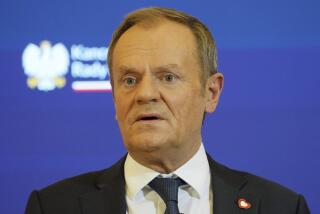The Stakes Are High in Poland
- Share via
Poland’s new non-Communist government is preparing to embark on the daunting task of simultaneously trying to transform the country into a parliamentary democracy while shifting from a state-controlled to a market economy. It begins under the most onerous economic conditions. The rate of inflation is now officially said to be running at 50% a month. The country’s recession is deepening. Its $40-billion foreign debt is seen as virtually unrepayble, raising questions about Poland’s future credit-worthiness. The attempt to move from this disaster area to a free economy will inevitably demand a period of austerity that must include cuts in government subsidies and slashes in real wages. From a people who have already given much, much more is about to be demanded.
Reformers in Poland as well as foreign advisers seem agreed that the painful shift must be undertaken all at once. As one Polish economist put it, “You don’t try to cross a chasm in two leaps.” The goal, the end point of the leap, is creation of a functioning and stable market economy by the end of next year. Jeffrey Sachs, a Harvard professor who is an adviser to Solidarity, writes that the first step in the reform effort “must be to regain financial control over the budget, and thereby to stabilize the currency.” But to do that requires cutting the enormous budget deficit, which has been funded by printing worthless money, and to cut the deficit requires ending subsidies on such consumer goods as coal and gasoline. Prices, meanwhile, must rise, but in order to reverse the course of inflation, wages will have to be held down. The unavoidable result promises to be a significant erosion in living standards.
Polish planners hope that outside aid, including a requested $700-million loan from the International Monetary Fund, can help cushion the many anticipated blows of the transition period. Food donations, from both Western Europe and the United States, have already been approved. But the Bush Administration and Congress still disagree over how large a total aid package should be offered, and what its components should be. While the House has already approved an $840-million plan to help Poland and Hungary, the Administration has so far agreed to assistance of only $427 million. At the end of this month President Bush plans to send a Cabinet-level committee to Poland to weigh how American agricultural and business management help can best be provided.
Congressional Democrats say that the Administration has been too slow to recognize the revolutionary changes taking place in Eastern Europe and too timid in moving to help the transition away from communism in Poland specifically. The White House reply is that until the institutions for wisely handling foreign economic aid are in place, rushing in with an enormous assistance program makes little sense. There is much to that argument, but there is also peril in proceeding in too leisurely a way to give the help that everyone agrees is desperately needed.
“History does not wait,” warned Jacques Delors, the president of the European Community. A non-Communist government in Poland, the first in 40 years, is about to be severely tested. If it fails, if Poles refuse to cooperate with the austerity program that is about to be introduced, then the country’s only credible alternative to a Marxist regime will be perceived as having failed. Timely foreign help is vital, not just for practical reasons, but as well for the psychological assurance it will provide that Poles don’t stand alone, that the outside world has confidence that they can succeed. The emphasis here is on timely . The economic problem is enormously complex. But the opportunity is unique, and the political stakes are unprecedentedly high.
More to Read
Sign up for Essential California
The most important California stories and recommendations in your inbox every morning.
You may occasionally receive promotional content from the Los Angeles Times.










